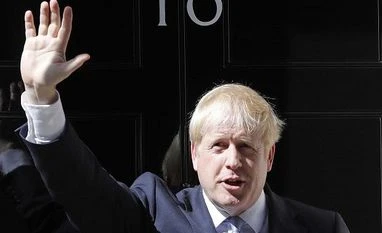British Prime Minister Boris Johnson suffered yet another setback on Thursday after MPs rejected his call to briefly suspend their business for his party's conference, highlighting the hostility he faces in parliament just weeks before Brexit.
In his seventh successive defeat in parliament, MPs voted to reject his call for three days off next week to hold his Conservative party's annual conference.
Parliament usually holds a recess during all the main party's conferences, but the vote came as tensions among MPs reached boiling point over Britain's EU exit next month.
The Supreme Court on Tuesday ruled that Johnson's decision to suspend parliament for five weeks was unlawful, as it had the effect of frustrating lawmakers ahead of the Brexit deadline.
MPs reconvened on Wednesday but, in a stormy session, Johnson showed no contrition and instead vowed to press ahead with his plan to leave the EU, no matter what.
His inflammatory language drew accusations -- including from his sister Rachel -- of stoking divisions in a country still split over the 2016 referendum vote for Brexit.
More From This Section
Johnson only took office in July but his threat to leave the EU on October 31 with or without a divorce deal with Brussels has put him on a collision course with MPs.
Thursday's vote was the seventh in a row that Johnson has lost in the Commons, where he no longer has a majority and where most MPs oppose a "no-deal" exit.
Tensions reached boiling point on Wednesday night during a combative, three-hour debate in which Johnson condemned the court ruling and accused MPs of trying to undermine Brexit.
He repeatedly slammed parliament for passing a "surrender act" requiring him to seek to delay Brexit if he fails to reach a deal with the EU in time.
Johnson, who also spoke of MPs betraying the referendum, was asked to tone down his language by friends of Jo Cox, an anti-Brexit MP murdered by a Nazi sympathiser during the referendum campaign.
But Johnson said that the best way to honour her memory would be "to get Brexit done", while dismissing one female MP's concerns as "humbug".
Cox's husband Brendan said the exchanges made him feel "a bit sick" -- while Johnson's own sister Rachel said on Thursday that the remark was "tasteless".
Labour leader Jeremy Corbyn accused Johnson of using language that was "indistinguishable from the far right".
Even some members of Johnson's Conservatives seemed taken aback at the language he used, which comes amid a rising number of attacks against lawmakers on all sides.
There was also criticism from Brussels, where Britain's most senior EU official, Commissioner Julian King said Johnson's language was "crass and dangerous".
But Johnson's spokesman declined to apologise for his rhetoric. "He believes we need to get the issue of Brexit resolved because it was causing anxiety and ill-feeling in the country," he said.
The fact that parliament will not be in recess next week does not stop the Conservative party's conference going ahead, but could affect the timing of key speeches.
Johnson is due to make his big closing speech to the meeting in Manchester on Wednesday, but he will now need to be back for prime minister's questions in the Commons.
He met with Conservative MPs on Thursday, where one said there was broad support for his position, and will later gather his top ministers to debate their next steps.
Downing Street insisted that he remained focused on getting a divorce deal with Brussels, which he hopes to agree with EU leaders when they meet on October 17/18.
Brexit Secretary Steve Barclay will be in Brussels on Friday for talks with EU negotiator Michel Barnier.
Johnson insists progress is being made in trying to rework the exit terms struck by his predecessor Theresa May, but rejected by the British parliament. However, the EU says it has not received any comprehensive proposals from Britain for a new deal.
The EU's chief Brexit negotiator Michel Barnier told reporters: "We are still ready to work on any legal and operational proposal with the UK". "We are still waiting," he said.
Johnson has called for an election to resolve the deadlock in parliament but opposition MPs say they will not support such a move until the threat of no deal is removed.
)